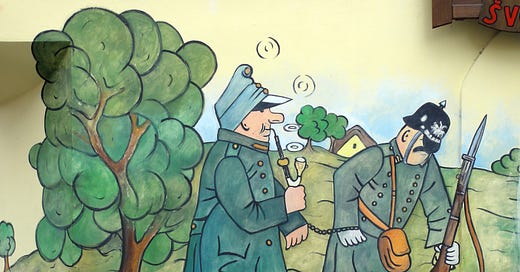At times, when we get to a point in a conversation with a particular friend, where he no longer feels comfortable with my arguments, he ends the conversation with a quote from Svejk:
“It can be said that way, but that’s bullshit”
While the way he is using it is mildly offensive, the quote itself is perfect. The only thing that always bugged me about it was that I did not remember it. How is it possible, I asked myself, that I cannot remember such a perfect point after reading the book more than once. I used to pick it up to randomly read parts of it when my mood needed a lift. It is hilarious no matter where you open it.
I was thinking about this yesterday morning in the context of leftist narratives. Of how perfectly describes them. I could use it to describe every second sentence of
when she is talking about current affairs. “It can be said that way, but that’s bullshit”Except I can’t. Not as a quote from Svejk.
As I was thinking about this, I was told to drop what I am doing because we were going on a trip. We were to visit someone, but we made a (to me) unexpected stop. We stopped at Lipnice, where Hasek wrote Svejk. I treat coincidences like this as signs, so I decided to address it here.
I started by trying to find the quote I didn’t remember. I couldn’t find it. The supposed quote was given to me in Hungarian, ostensibly from a Hungarian translation. I searched two Hungarian translations, but I could not find anything even remotely resembling it.
My friend must have received it from a secondary source, and just like to me, it must have appeared to him perfectly Svejkian as well.
The question then is, what do I do? Keep using it? If so, with or without attribution? Should I use it as my own? Should I attribute it to my friend?
Presenting it as a quote from Svejk makes it part of the whole Svejkian universe of absurdity handled with common sense.
The reason why I was looking for the quote was the missing context. Whenever I use the ‘quote’ I will inevitably place it in a new context, but that context is dependent on the richness of the original, not just in specifics, but as part of the world of Svejk.
It is a fascinating conundrum. What do YOU think of it? Can I give a new life to the now orphaned quip in the context of manipulative narratives? Do I need a cultural context to be a legitimate smartass?
Like everything else on Substack, this is a reader supported publication.
You can help it by following or subscribing.
You can engage with it by clicking on like and/or commenting.
A ‘like’ costs nothing and is worth a lot.
You can help this Stack grow by sharing, recommending, quoting or referencing it.
You can support it by pledging your financial support.
Any and all of it will be much appreciated.





It contains Svejkiness, keep using it.